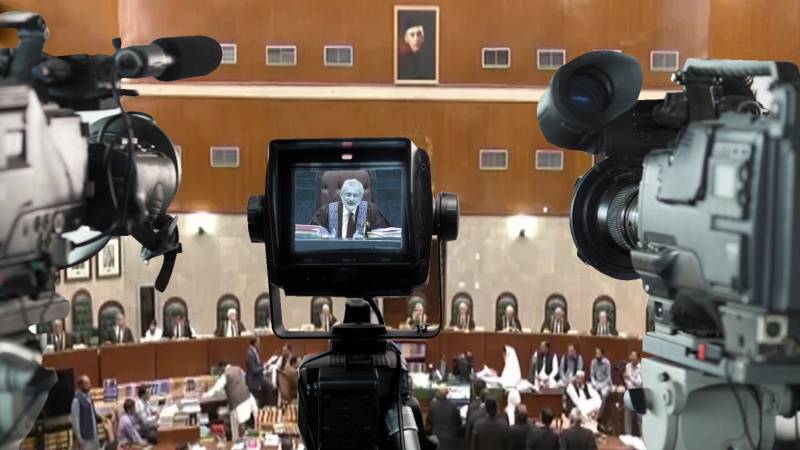
The Pakistan Muslim League-Quaid (PML-Q) on Monday threw its weight behind the Parliament over its ability to craft laws and that it strengthens the judiciary ahead of the Supreme Court of Pakistan taking up the Practice and Procedure Act next week.
In a concise statement submitted to the top court in a case challenging the Practice and Procedure Act 2023 (PAPA 2023), the PML-Q argued that under Article 191, the Parliament clearly has the right to legislate on matters pertaining to the practices and procedures adopted in the Supreme Court.
In the 12-page statement, submitted through its lawyer Advocate Zahid F. Ebrahim, the PML-Q contended that Entry 55 specifies the field of legislation to include enlargement of the jurisdiction of the Supreme Court and the conferring thereof of supplemental powers.
Ebrahim said that under the Supreme Court Rules 1980, there are provisions that allow the legislature to determine the practice and procedure of the top court regarding the constitution of benches.
In its statement, the PML-Q contended that the constitution of benches and fixation of cases while exercising jurisdiction under Article 184(3) is consolidated in the hands of one person, the chief justice.
It argued that such processes without the PAPA 2023 are entirely opaque.
"One could even candidly admit that it is shrouded in mystery not only for the litigant public, for whom this entire judicial structure is created to serve but at times even the officers of the court feel that questions on how and which cases are chosen for exercise of suo moto jurisdiction, how cases are fixed, which case gets primacy and what basis will determine the constitution of benches, could all benefit from more transparency and collective decision making within the Institution," read the concise statement.
The PML-Q continued that recent experience of discretion held by an individual has been problematic.
"Most respectfully, it has even given rise to discontent within the institution, but also to painful speculations by senior observers of the apex court who report on its workings," the statement said, adding, "The 2023 Act specifically acknowledges such issues and seeks to advance constitutional rights and obligations."
The party argued that the objects and reasons the new law seeks to advance would strengthen public confidence in the judiciary and reinforce the foundation for a society based on the 'Rule of Law'.
"But if discretion for the exercise of suo moto jurisdiction, the responsibility of allocating work and constitution of benches is shared by the Chief Justice with two of the senior-most judges of the Supreme Court will boost the public confidence in the judiciary and further strengthen the 'Independence of the Judiciary'."
The PML-Q further contended that the consolidation of power in the hands of one fallible individual has not been encouraged under our jurisprudence.
It added that hard struggle and sacrifice over many generations has finally made the goal of an 'Independence of Judiciary' attainable.
"We must embrace the opportunity to reform, to share the responsibility placed in the hands of the chief justice with his two senior-most brothers."
Consolidating power in an individual and impacts on court
The statement noted that former chief justices, including Iftikhar Muhammad Chaudhry, Saqib Nisar and Gulzar Ahmed, actively supported the exercise of the original jurisdiction of the Court under Article 184(3).
"Each of the above chief justice's legacy, in many ways, has been affected from the fallout respectively from the Steel Mill's Case, the Pakistan Kidney and Liver Institute (PKLI Hospital) Case, and the Nasla Tower Case," it reminded, adding, "Each have had a significant impact on their legacies, unfortunately not salutary."
Concentrating powers
Addressing Section 3 of the PAPA 2023, regarding the adoption of procedure to exercise suo moto powers, the statement said that it does not "abridge the power of exercising jurisdiction under Article 184(3) by the Supreme Court, but only harnesses the unstructured discretion hitherto exercised by the Chief Justice alone by sharing it with his two senior-most colleagues," the PML-Q submitted.
"The same is the case with Section 2 of the 2023 Act, where the matters relating to fixation of cases and constitution of benches is entrusted to a Committee rather than burdened on the shoulders of one individual."
The PML-Q concluded that the PAPA 2023 is a constitutional document that will only promote the 'Independence of the Judiciary', 'the Rule of Law', and the 'Right to Access of Justice and Fair Trial'.
It requested the bench to dismiss the petitions challenging PAPA 2023.

